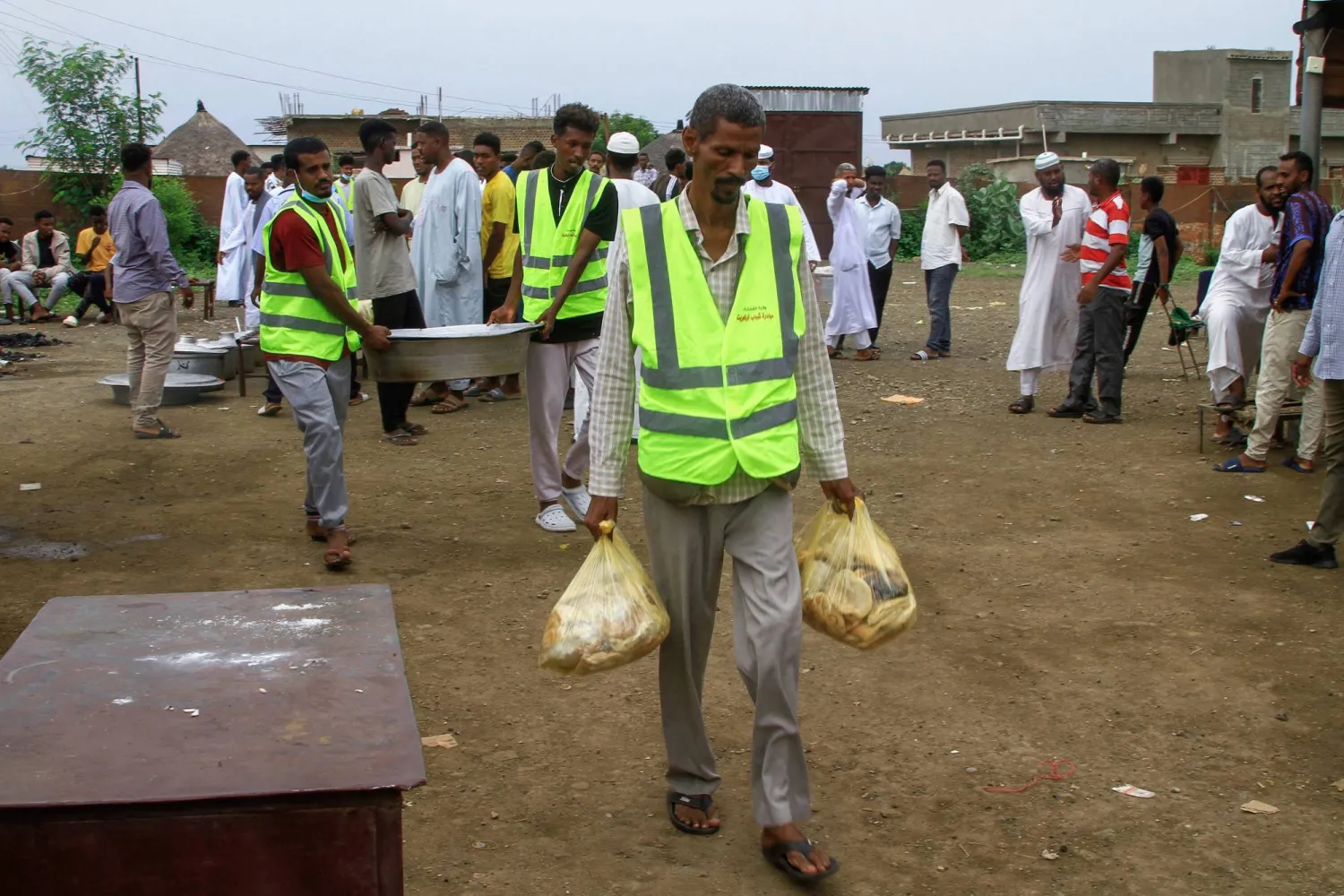For over 27 months of ongoing war in Sudan, volunteers across multiple regions and cities have been tirelessly working to save lives — both in active conflict zones and relatively safe areas — by providing essential services such as community kitchens, food distribution, healthcare, and organizing evacuations from war-torn areas to safer locations.
Despite the worsening security situation and increasing violations, volunteers risk their lives daily to deliver humanitarian aid to thousands of displaced people in safe cities. They also strive to supply food, medicine, and shelter in conflict zones, while facing threats and targeting from both warring parties, including arrests and detentions.
Impactful Roles
Murtada Jabr Al-Dar, a volunteer in Kadugli, the capital of South Kordofan State, told Mashawir platform that the deteriorating conditions and harsh realities — coupled with the government’s inability to provide basic services in conflict zones — have compelled volunteers to step in and fill a critical gap. With support from charitable donations, diaspora contributions, and local and international organizations, they are offering essential services, especially food and healthcare.
He explained that major obstacles hinder the delivery of food and medical supplies to hospitals and health centers. Aid is often stopped at checkpoints or even confiscated before reaching its destination — especially after the closure of the national road between Dilling and Kadugli.
Jabr Al-Dar added that road closures have dramatically worsened the crisis, particularly due to the lack of life-saving medicines, medical supplies, and food. Available goods in local markets have skyrocketed in price.
He also noted that many volunteers face targeting and occasional imprisonment. There are increasing incidents of looting and theft of food and medicine during transport or from storage sites. Both the Sudanese Army and the Rapid Support Forces (RSF) have detained volunteers on suspicion of cooperating with the opposing side, with many subjected to searches and arrests.
Services Amid Challenges
In the same context, Mahmoud Bashir, a volunteer in Kalakla, Khartoum, told Mashawir that volunteer efforts have continued for over 27 months. These efforts go beyond food and utility services; groups of doctors and pharmacists have been formed to provide essential medical care, particularly for chronic diseases like diabetes and hypertension. They also handle emergency cases such as childbirth and minor surgeries, with medical staff offering free services at some hospitals and clinics.
Bashir believes that the government has failed to address the catastrophic conditions affecting civilians — especially as famine spreads, diseases surge, and casualties increase due to indiscriminate shelling. Volunteers have taken it upon themselves to help, despite the daily risks and targeting by both sides of the conflict.
He complained that a lack of financial support and donations has forced more than half of the charity kitchens to shut down entirely, while others are barely operating, often providing just one meal per day. These initiatives rely heavily on contributions from expatriates, local donors, and in-kind donations of goods like lentils, flour, and beans from merchants in safe cities.
Distrust and Accusations
Community activist Fadel Saleh explained to Mashawir that both the Sudanese Army and the RSF distrust volunteers. This stems, in part, from the fact that some volunteers were once members of the Resistance Committees that led the 2018 protests which ousted former president Omar al-Bashir.
He pointed out that although volunteers have been working in the humanitarian field since the war broke out — offering crucial services — receiving funding from organizations and expatriates has made them a target of suspicion. Many of the volunteer groups are not registered with the government and use personal bank accounts for donations, with no formal financial reporting.
Saleh noted that the government often views volunteers as political activists rather than genuine humanitarians, while the RSF accuses them of receiving funds from the army. As a result, their sacrifices are met with mistrust and accusations rather than encouragement and recognition of their role in sustaining humanitarian solidarity amid war and crisis.
Honorable Humanitarian Work
Sustainable development specialist Maryam Musa told Mashawir that volunteers played a pivotal role in responding to humanitarian needs immediately after the war began — initially in the capital’s three cities: Bahri, Omdurman, and Khartoum — and later expanding into states experiencing armed conflict.
Musa emphasized that the targeting of volunteers is unjustified, as they are working to assist the hungry, sick, and displaced, representing the communities they serve. Their actions demonstrate that they are not affiliated with any political side or armed faction.
She stressed the importance of supporting humanitarian efforts that have saved millions of lives despite the dangers of indiscriminate bombing, lawlessness, and accusations by both warring parties. Such solidarity is a vital expression of humanity in the face of armed conflict and disaster.
